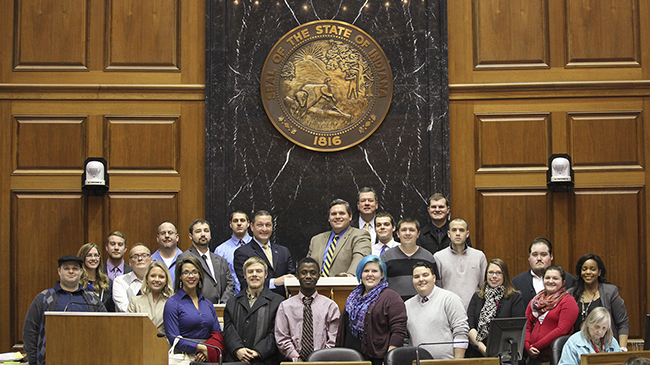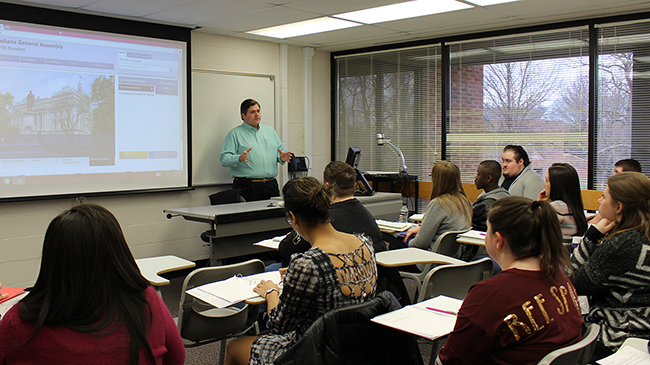
IU Southeast political science students are welcomed by Reps. Terry Goodin (l), Ed Clere (c) and Steven Stemler (r) at the Indiana Statehouse.
By Steven Krolak
(NEW ALBANY, Ind.) — On Thurs., March 3, elected members of the Indiana House of Representatives put aside partisan differences in a common cause: to give an enthusiastic round of applause to students of Prof. Rhonda Wrzenski’s Political Science Y306 class.
The students were visiting the Indiana Statehouse as guests of Rep. Ed Clere, an IU Southeast alumnus and 2016 recipient of the Chancellor’s Medallion.
The visit was a key component of the upper-division course, which focuses on state politics in the U.S. It followed a preparatory guest lecture to the class by Rep. Clere in February.
A day of insights
In Indianapolis, the students witnessed the swearing in of Indiana’s new Lt. Governor Eric Holcomb, toured the state capitol building and observed the legislative session from the gallery. At an appropriate time in the proceedings, Rep. Clere introduced the class and gave them recognition in the chamber. It was a signature moment in a special day that offered students a unique perspective on the procedures and culture of political life in Indiana.
For the students, the experience was rife with insights, from the civil tone of debate and the importance of networking to the evident spirit of bipartisanship and the high level of genuine commitment to what is best for the citizens of the state.
Mark Jallayu is a sophomore from Liberia, West Africa, majoring in political science with a minor in journalism and pre-law. He had expected a more partisan atmosphere, so was surprised and impressed by both the general civility and the respect for the legislative process that saw a bill move to vote and pass, before his very eyes. (The students could see representatives vote by touch-screen.)
Stacy Gibson, a nontraditional senior from Middletown, Ind. majoring in history with a minor in political science, was struck by the representatives’ professionalism and passion for the legislative process. She also noted the high degree of bipartisan cooperation.
These reactions came as no surprise to Clere, who noted that few people from the region have the opportunity to journey to Indianapolis to see the political process in action, and that dwindling media resources have translated into less coverage of state government, making such visits all the more important to forming a genuine understanding of how policies are generated and laws enacted.
“There’s no substitute for experiencing it in person,” said Clere of the legislative session. “There’s a lot you can learn from a textbook, but going there and seeing it in person takes it to a whole different level.”
The Statehouse trip is no one-off. It’s an integral part of the course, and preparing for it requires time and dedication. Besides maintaining the relationship with Rep. Clere’s office, Wrzenski worked with the state capitol tour office to schedule the tour, notified various representatives from southern Indiana of the visit, made arrangements to meet with state legislative intern directors, and selected a day that the legislature would be very active in session. She also worked with the Dean of Student Life at IU Southeast to organize bus transportation and put together materials for students involved in the trip, such as a letter to faculty explaining their absence from class. She also instructed the students in the observation of the often unwritten professional rules of capitol decorum through guidelines for appropriate dress and conduct. Afterwards, there were posts to social media and thank-you notes to be signed for sponsors, tour guides and others involved in the trip.
For Wrzenski, the visit was not just a class exercise but an opportunity to advance her students’ career prospects and to serve the university’s own strategic goals.
“Field trips build relationships between the campus and the community and provide an opportunity to make a positive impression on the state legislature,” she said.
Focus on state and local government
Y306 contains all the reading and writing one would expect of an upper-division course. As part of the class experience, students read materials on lawmaking, complete a paper reflecting on the memoir of a long-term speaker in the Vermont state legislature and produce a comparative state policy paper and presentation of the course of the semester in small groups.
But the course is unusual in several ways. For one thing, the focus is on state and local government. Generally speaking, political science courses tend to concentrate on political theory, the federal government or international affairs. By zeroing in on state and local government, Wrzenski not only illuminates a less-understood facet of political life, but opens doors to a dynamic area in which elected officials are very accessible and the input of individual citizens can be much more effective.
“The average American is unlikely to have a sit-down meeting with the president of the United States, but the same cannot be said of all local and state representatives,” Wrzenski told students. “State and local governments make decisions about a wide range of topics such as access to marriage, public school funding, the legalization of marijuana, the death penalty and welfare reform.”
The other unique aspect of the course is the richness of its experiential components, including guest speakers.
Clere has visited her classes in each of the past three years, introducing them to specific bills and issues being discussed in the state house in order to make their visit more informed and meaningful. He also devotes time to fielding their questions, and listening to their points of view.

Rep. Ed Clere, an IU Southeast alumnus, gives an insider’s perspective on the political process to students before the trip to Indianapolis.
In addition, Daniel Frockt, chief financial officer for Metro Louisville and Dudley Cotton, budget analyst for Metro Louisville, visited the class and spoke on state and local finance. Cotton also shared insights from his experience as the former lead advisor on fiscal policy for the Kentucky Speaker of the House of Representatives and the chairman of the House Appropriations and Revenue Committee. Furthermore, Jennifer Wagner, founding principal of Mass Ave Public Relations, an Indianapolis, Ind.-based woman-owned publicity and public relations firm, lent her insights to class material on political parties and interest groups. She addressed the work her company has done around efforts to expand civil rights protections statewide for gender identity and sexual orientation on behalf of one of her clients. The Indianapolis Star highlighted this as one of the top five issues to watch during the 2016 legislative session.
“Guest speakers help students to connect course concepts from their readings, discussions and assignments to real-world events and individuals,” Wrzenski said, adding that they may also be a source of internships and other career possibilities.
Engaging learners through real-life experience
The visit and impressive roster of guest speakers are just two of the many ways that Wrzenski seeks to engage different types of learners and connect course material to real-life situations.
“Students should not be passive receptors of the educational process,” she said.
From discussions and collaborative projects to think-pair-share exercises and multimedia presentations, she expands the curriculum and addresses different learning styles, challenging students to take control of their own educational journey.
In this, she follows in a tradition of IU Southeast faculty who continue to create experiences beyond the classroom to deepen engagement with their fields and to foster a mentality of lifelong learning.
The approach certainly pays real dividends in giving students a head start on their careers.
“When undergraduates have the opportunity to pursue research as an upper-division course requirement, senior capstone or collaborative faculty-student project, they become more prepared for the research expectations of law or graduate school,” Wrzenski said.
The same benefits can be realized from experiential learning opportunities, which Wrzenski also strongly supports.
“When students participate in internships or study abroad, they expand their cultural horizons and global awareness, increase their level of personal maturity and enhance their marketability in a competitive job market,” she said.
For Gibson, who aspires to teaching or possibly working for the government, the visit and the course of which it forms a part have helped to highlight the importance of informed decision-making to the basic requirements of citizenship.
“I believe we all have a responsibility to understand what issues our states are debating and how they relate to our communities,” she said. “We also have a responsibility to vote for candidates during election cycles, but to do so intelligently by researching their stances on the issues most important to us, not just by their party affiliation.”


